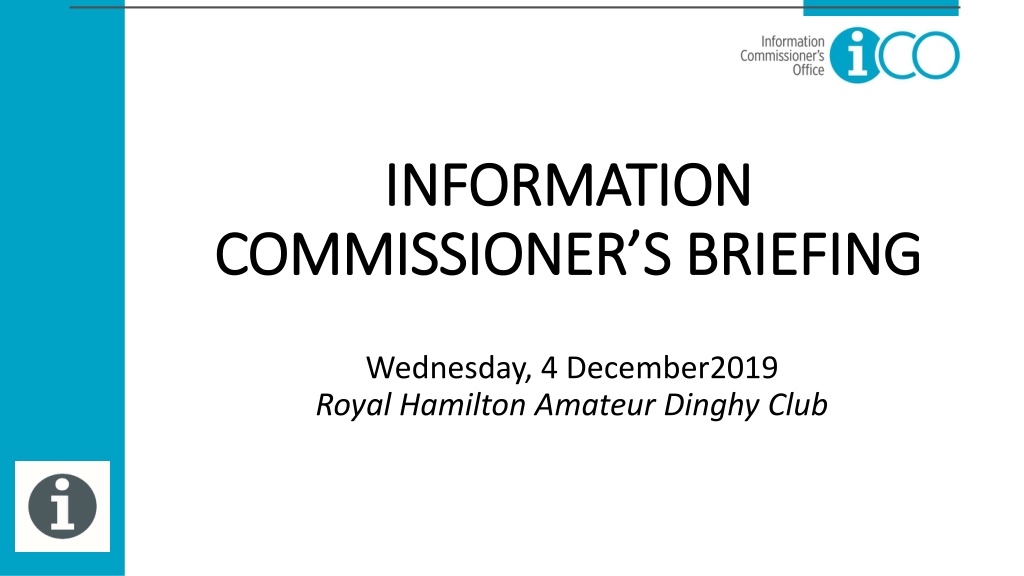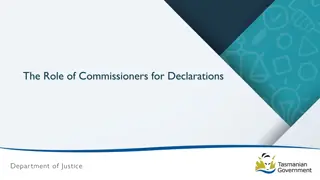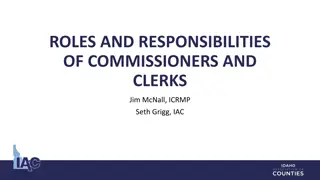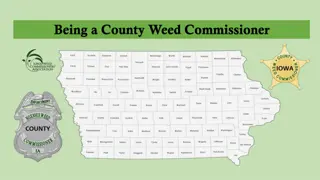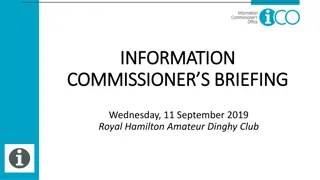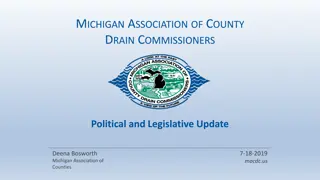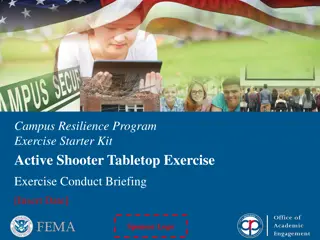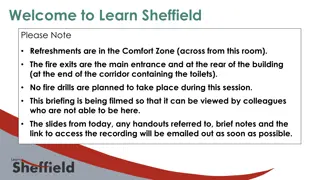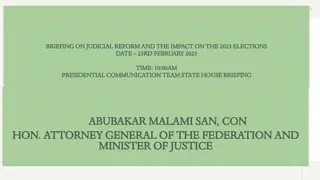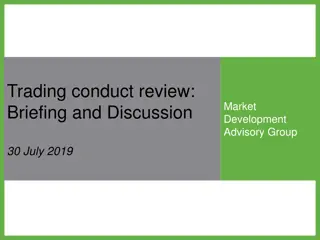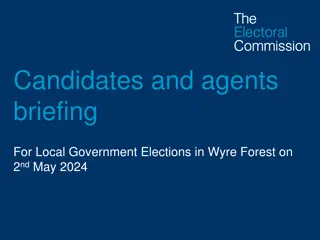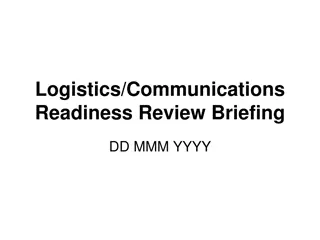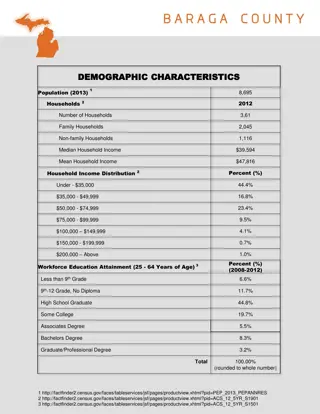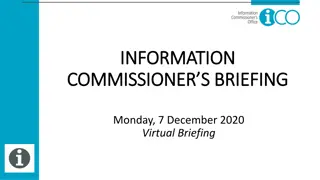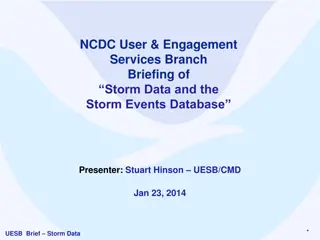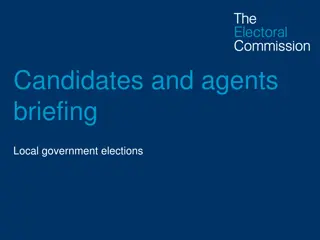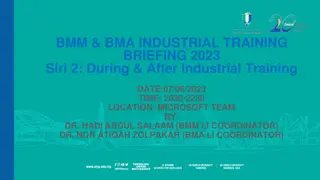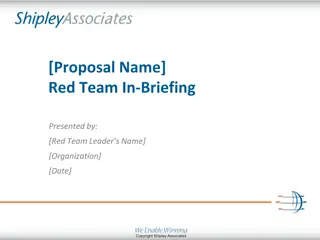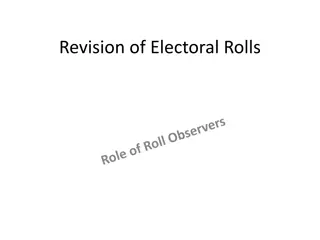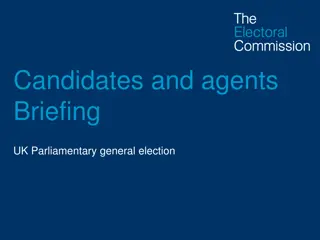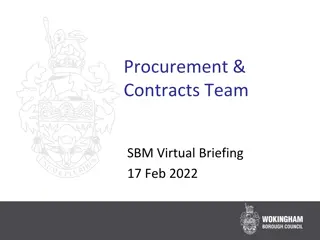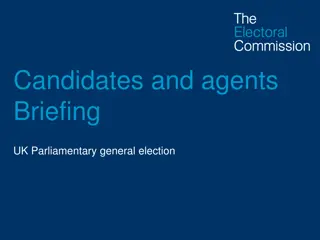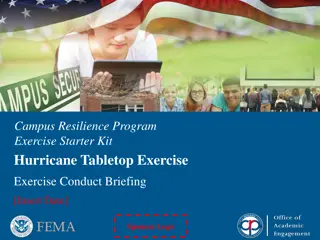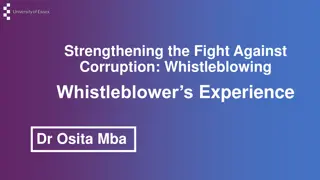Information Commissioner's Briefing and Role Overview
The Information Commissioner's Briefing held at the Royal Hamilton Amateur Dinghy Club on December 4, 2019, covered various topics such as trade secrets, commercial interests, and contractual negotiations. The role of the Information Commissioner in promoting public access to information was highlighted, along with the decision-making process during information requests. The ICO Exemption Guidances were also discussed, providing insights into exemptions and access to public records under the PATI Act.
Uploaded on Sep 21, 2024 | 0 Views
Download Presentation

Please find below an Image/Link to download the presentation.
The content on the website is provided AS IS for your information and personal use only. It may not be sold, licensed, or shared on other websites without obtaining consent from the author. Download presentation by click this link. If you encounter any issues during the download, it is possible that the publisher has removed the file from their server.
E N D
Presentation Transcript
INFORMATION INFORMATION COMMISSIONER S BRIEFING COMMISSIONER S BRIEFING Wednesday, 4 December2019 Royal Hamilton Amateur Dinghy Club
AGENDA AGENDA 9:00 9:10 9:10 9:30 9:30 9:40 9:40 10:15 10:15 10:30 10:30 10:55 10:55 11:25 Welcome and Introductions Overview of section 25 Trade secrets section 25(1)(a) Commercial interests section 25(1)(c) Break Commercial value section 25(1)(b) Contractual or other negotiations section 25(1)(d) Wrap-up and Evaluations 11:25 11:30
The Information Commissioner The Information Commissioner An independent public office mandated to promote public access to information.
Role of the Information Commissioner Role of the Information Commissioner Decisions During PATI Request Process PATI Judicial Review & Decision Internal Review Decision Information Commissioner s Review & Decision Request & Initial Response Information Commissioner Information Officer Head of Authority Judge
Information Commissioner Decisions (& ICO Guidances) Uphold standards and tests, drawing from: PATI Act and Regulations and Practice Codes Other local law International best practices for access to information laws
Overview of section 25 Overview of section 25 four commercial four commercial information exemptions information exemptions
Exemption: Exemption: An exemption is one of the listed reasons in Part 4 of the PATI Act that allows a public authority to deny access to a public record.
ICO Exemption Guidances ICO Exemption Guidances Explains each exemption in 3 ways: In brief Narrative Questions to consider Guidances from the Ireland and the UK ICO may also be helpful
Steps to apply an exemption: Steps to apply an exemption: Start with understanding that record must be disclosed unless public authority can justify application of the exemption Locate, or attempt to locate, the records
Steps to apply an exemption: Steps to apply an exemption: Once you have located the records, assess whether an exemption may apply Follow the steps to apply that specific exemption each one will be different
Section 25: commercial information Section 25: commercial information exemptions exemptions Balances the competing interests of the business community with the rights of the public to access information, and to further accountability, transparency and public participation in decision making and public spending.
Section 25 Section 25 Commercial Information exemptions Commercial Information exemptions 4 specific exemptions in section 25 All section 25 exemptions are qualified so the public interest test applies Three require you to show that disclosure could cause a specific harm
Is exemption unavailable? Is exemption unavailable? Section 25(2) may prevent application of the exemption when: Records contain requester s own information Written consent is given to the public authority Person who gave information was informed in advance
Trade secrets Trade secrets section 25(1)(a) section 25(1)(a) Generally, a trade secret: is commercial information that would cause harm to the owner if it was disclosed to a competitor, AND the owner has made reasonable efforts to keep it a secret
Commercial interests Commercial interests section 25(1)(c) section 25(1)(c) Exempts information if disclosure could reasonably be expected to have an adverse effect on the commercial interest of any person to whom the information relates.
Commercial interests Commercial interests section 25(1)(c) section 25(1)(c) 5 questions to ask: 1. Who does the information relate to? 2. What is their commercial interest? 3. What adverse effect could disclosure cause?
Commercial interests Commercial interests section 25(1)(c) section 25(1)(c) 4. How likely is this to occur (must show at least that it could reasonably be expected to occur)? 5. If the exemption is engaged, does the balance of the public interest still require disclosure of the records?
Commercial interests Commercial interests section 25(1)(c) section 25(1)(c) Case discussions: Decision 12/2018, Ministry of Finance Decision 09/2019, Department of Public Lands and Buildings
BREAK BREAK The PATI Act A promise that Bermuda would be a place where government operates in the sunshine of public scrutiny .
Commercial value Commercial value section 25(1)(b) section 25(1)(b) Exempts information with commercial value that could reasonably be expected to be destroyed or diminished by disclosure.
Commercial value Commercial value section 25(1)(b) section 25(1)(b) 5 questions to ask: 1. Does the information have commercial value and can you describe its nature? 2. What is the destruction or diminishment of the commercial value that could occur?
Commercial value Commercial value section 25(1)(b) section 25(1)(b) 3. How could disclosure cause this destruction or diminishment? 4. Could this reasonably be expected to occur under the circumstances? 5. If the exemption is engaged, does the public interest still require disclosure?
Commercial value Commercial value section 25(1)(b) section 25(1)(b) Case discussion: Decision 09/2019, Department of Public Lands and Buildings
Contractual or other negotiations Contractual or other negotiations section 25(1)(d) section 25(1)(d) Exempts information when disclosure could reasonably be expected to prejudice the conduct or outcome of contractual or other negotiations of any person to whom the information relates.
Contractual or other negotiations Contractual or other negotiations section 25(1)(d) section 25(1)(d) 5 questions to ask: 1. Who does the information relate to? 2. What are the relevant negotiations? 3. What is the specific prejudice to conduct or outcome?
Contractual or other negotiations Contractual or other negotiations section 25(1)(d) section 25(1)(d) 4. How can disclosure cause the prejudice? 5. Can you show that prejudice could reasonably be expected to occur? 6. If the exemption is engaged, does the public interest still require disclosure?
Contractual or other negotiations Contractual or other negotiations section 25(1)(d) section 25(1)(d) Case discussion: Decision 09/2019, Department of Public Lands and Buildings
Public interest test in the Public interest test in the commercial information context commercial information context Weighing the possible harms from disclosure against the benefit to the wider public
Insights from cases: Insights from cases: Keep the purpose of the Act in mind Read exemptions narrowly Consider partial disclosures Avoid assumptions, over generalisations, and speculation Rely on objective facts and support
Wrap Wrap- -up up Learn more about Information Commissioner s decisions: Decisions published on www.ico.bm Monthly Roundups highlight learning lessons ICO Guidances published on www.ico.bm General questions for ICO at 294-9181 or info@ico.bm
INFORMATION INFORMATION COMMISSIONER S BRIEFINGS COMMISSIONER S BRIEFINGS 2019-2020 Schedule Wednesday, 11 March 2020
